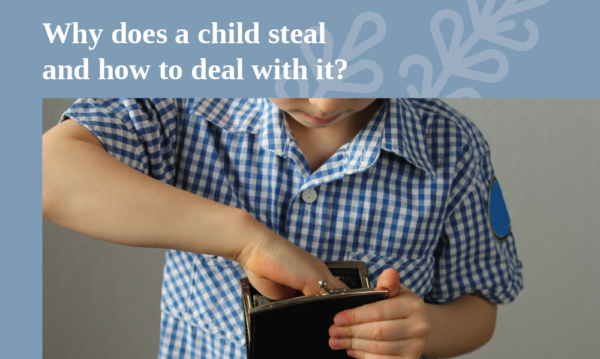Let’s look at the following example: You are with your child in the supermarket and pay at the checkout. After you leave the shop, you find that the child has secretly taken a box with candies and put it in his pocket. How will you react? A lot of people would find it funny, and some would think it was a misdemeanor. Others might have given more serious implications to this practice.
The parent’s reaction to this behavior of the child is decisive, both to understand his “error” and not to repeat this act in the future.
At what age do children start stealing?
Usually, children start “stealing” or taking something secretly during the first grades of primary school. However, children’s possessive behavior occurs from the age of 2-3 years, where children wish to hold on to those things belonging to others without realizing the importance of this act. Then, of course, we are not talking about theft, as the child needs to keep for him something that he likes or impresses him.
The concept of ownership of the object and the way they claim it reveals children’s desire to be separate and conquer the world. In infancy, children have not yet grasped the concept of foreign ownership; all objects are “theirs ” potentially, so they may grab something that does not belong to them without asking the owner.
At the age of 6-7 years, when the child has not understood the concept of ‘taking something that does not belong to me,’ he is ‘stealing’ without understanding its consequences. If he has not realized that this act violates specific ethical rules, it would not be right for him to be punished by the parents.
Why are the kids stealing?
In most cases, children use theft to attract others’ attention, especially parents, when they are too busy with other activities. Children can also steal when they lack the amount of love they need, such as parents being absent, indifferent, or too strict with the child.
There are times when children get carried away by their peers, and by stealing various objects or money, they seek to be more accepted than others. Again, they are influenced by relentless modern consumerism and wish to acquire more and more material goods.
Finally, there are rare cases of children with a psychogenic tendency to steal.
What can parents do when children steal?
• It is essential that parents are close to their children because, in this way, children are more sensitive and more able to understand and respect others’ rights. These concepts are best understood when taught from an early age. Children who feel tied to their parents are aware of their mistakes because they have developed their conscience and moral values. They can empathize and understand the impact of their actions on others. They know how to establish and maintain trustful relationships; lying, fraud, and theft undermine this feeling of trust. Also, the child is more likely to accept parents’ advice and values because of this parent-child connection.
• Teach the child the concept of ownership, the idea of “giving” and “borrowing.” From 2 to 4 years old, the child can occupy the property (this toy belongs to someone else), but he cannot wholly believe that it does not belong to him. Moreover, from the age of 2, the concept of “mine” and “yours” begins to be taught. Look for opportunities to consolidate the idea of ownership: “This game belongs to Katy.”, “This is Bill’s car” “Whose socks are these?”. As the child understands ownership and the rights that accompany it, the logical conclusion is that ignoring these rights is wrong. “It’s mine,” insists the four-year-old boy, whose parents find an unknown toy in his bag. “You wish it was yours,” the parent replies. “But now tell Dad who the game belongs to.” “To John,” confesses the child. The father can reply, “If John took your game, and specifically your favorite, you would feel sad when you found out it was missing. What would you like John to do?”. The best way to teach children values that will last over time is to draw lessons from the children themselves and impose them. It is preferable, if possible, for the solution to come from the child himself.
• Correct the act of theft. The delivery of stolen items by the little “thief” sometimes requires masterful negotiation. By encouraging and helping the child return the stolen items, you teach him that theft is wrong and we should correct our mistakes. If, for example, you find the wrapper of candy, it is good to return to the store with the child, who will apologize and pay for the candy with money from his money box.
• Determine the cause of the theft. Find out what motivates the child to steal. Usually, the child who steals, despite your teaching of honesty and trust, faces a deeper problem that needs to be solved. Is the kid angry? Is he stealing to defuse his anger? Does he need the money and feel that stealing is the only way to get what he thinks he needs? If so, give him a sum of cash for pocket money. Suggest he takes over some housework. Help the child learn the value of work so that he wins games instead of stealing them. Usually, the child who steals is characterized by low self-esteem and needs to enhance his value or gain the attention of those around him. Does your child need more supervision? Perhaps redefining priorities and reconnecting with the child can help.
• Consider the following risk factors to see if your child has a chance of stealing:
– low self-esteem,
– impulsiveness (strong will, but an inability to control),
– cut off from the family,
– being quickly carried away by others,
– change in family status (divorce, illness/death of a family member),
– marginalized,
– being easily bored.
If you focus on helping your child deal with these risk factors, lies and thefts need to subside.
Praise honesty. Your five-year-old finds someone’s wallet and brings it to you. Praise it for this act: “Thank you for bringing Mom the wallet you found. Now, let’s see if we can find out who it belongs to. I bet this man will be delighted that you found it, just as you would feel if you lost something valuable and someone found it and returned it to you.” Avoid saying, “Thank you for telling the truth.” Some kids may not have thought about keeping their wallet, and you do not need to instill in them the concept of dishonesty. Whatever kind of praise you give, convey the message that your child did exactly what you expected.


